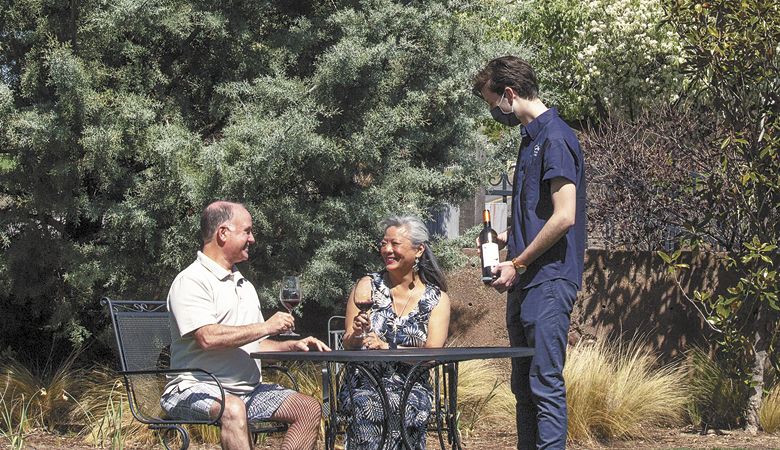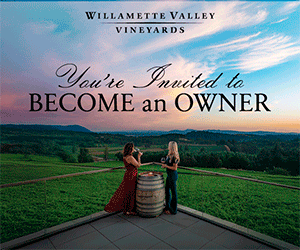Out(side) You Go!
Tasting rooms prepare for summer
As COVID-19 vaccines increase, so do plans for summer wine tasting.
“This really opens the door to a lot of things,” said Alex Sokol Blosser, president of the Oregon Winegrowers’ Association. Delay in vaccine availability and bottlenecks remained a growing frustration. Last month, the vaccination process accelerated just in time for this crucial tourism season.
“There’s definitely a lot of optimism,” he continued. “Now, instead of dealing with getting vaccinations, everyone’s goal is hiring for the outdoor season.” It’s a welcome change of direction for an industry dealing with virus-related shutdowns and limited restarts for more than a year.
Where are the workers?
But re-starting includes its own issues: “We found [at Sokol Blosser Winery] it was a lot easier to pull the plug and shut everything down last year than it is to get up and running again,” he said. “The challenge for all of us [owners] is that we’re needing to hire right now. Everyone’s bulking up at the same time.”
Sokol Blosser mentioned other factors contributing to worker scarcity. “There are still a number of schools not back in session, but as more open it will free up a lot of individuals who don’t have the ability to get child care or pay for it,” he explained. Another issue is hesitancy of some workers to return while the pandemic continues. “That’s why I think getting vaccinations is such a big deal,” he said. “If enough people are vaccinated, this will take care of itself.
“At Sokol Blosser, we’re open five days a week, but if we could hire a full crew, we’d be open seven days a week,” he noted. “We have so many plans and ideas for summer events but not enough people to staff them.”
Pandemic still lurks
There’s real hope restrictions can be eased during the summer months. And there’s a chance the threat of new contagious variants of virus strains lessen as more people receive vaccinations. But COVID-19 is not over yet. Here are current limitations at tasting rooms and restaurants:
• Indoor dining is allowed but cannot exceed 50% of maximum capacity, or lower, depending on individual county risk level.
• Outdoor dining is allowed but must not exceed 300 people.
• No more than eight people can be seated per table both indoors and outdoors.
• Doors must close no later than midnight.
• Masks are still required upon entry, but they can be removed at seating. Servers will continue to be masked and at least six feet away.
Going for it
With pandemic risks still possible, a robust summer wine season is no certainty. But Sokol Blosser underscored a prevailing spirit in Oregon winemakers when he emphasized, “Look, we make our decisions based on hope, not fear.” After a muted 2020 summer, he and his colleagues want to go all out.
Here’s a regional look, south to north.
Craig Camp, general manager of Troon Vineyard and president of the Applegate Valley Vintners Association, already notices an increase in California license plates at his and the other 19 vineyards and wineries making up the Applegate Valley Wine Trail, approximately 30 miles north of the state border. “Last summer was actually successful for us, and this year looks even bigger,” Camp said. “Everything is designed to be outside here, so it’s no big burden to emphasize outdoor options.”
Camp believes many in the new visitor surge are “people who used to go to Napa and Sonoma but find it to be more authentic here.”
Ross Allen, owner of 2Hawk Vineyard and president of the Rogue Valley Vintners Association, indicated the majority of wine enterprises — as in the Applegate Valley — remain small, family-run, craft operations producing 1,000 or fewer cases a year. “About 90% of their income is from tasting room sales,” he explained. “There are just a handful of wineries big enough and nationally distributed here to have significant retail sales.”
Together, the two areas — the Applegate actually exists within the Rogue Valley AVA — leverage Southern Oregon’s largest community fundraising effort, Asante Foundation’s Oregon Wine Experience, to help promote regional wine tourism.
Last year, Asante made a gutsy call to transform the annual summer event for 2020, and changed it into a hybrid virtual and live (small groupings) presentation, which it will repeat this year. Local wineries work closely with the Medford-based foundation in this extensive regional event that draws international attention. The event remains an effective way to attract visitors just as hungry to experience it as the wineries are to pour.
Farther north, the Umpqua Valley, with a similar mix of mostly small family wineries and some large ones as well, will use its decades’ old community event, Greatest of the Grape, to attract tasting room visitors. Chris Hudson, co-owner of Lexème Winery and president of the Umpqua Valley Winegrowers Association, explains how this iconic celebration, looking to stage its golden 50th edition after a year off in 2020, will present this year’s events. “We’ve re-positioned this from its traditional March date to August so we can take advantage of outdoors for multi-tastings, pairings and live music,” he said. “It will be a total transformation of what we did in the past.”
“We’re excited to welcome back guests,” said Kim Bellingar, owner of Bellingar Estates and president of the Willamette Valley Wineries Association. “We’re already seeing more winery visits. Tours look full as we go into May. We’re seeing a lot of pent-up demand among consumers.”
Popular summer celebrations in the state’s largest wine region have made some announcements regarding their status. Oregon Pinot Camp will be postponed until 2022, but the International Pinot Noir Celebration, customarily set in McMinnville the last weekend in July, will become a virtual package for 2021, according to John Hernandez, IPNC assistant director. The package includes 18 bottles, eight of which will be tasted at a July 24 virtual “grand seminar.”
For Brian McCormick, owner of Idiot’s Grace Winery and president emeritus of Columbia Gorge Winegrowers Association, winemaking fits where it has to. He’s a full-time farmer on the Oregon side of the Columbia River with pears and cherries to cultivate along with an array of food grown on his farm for the Gorge farmer collective and local restaurants. That’s the way it is with many of the nearly 30 members of the association on both sides of the river.
McCormick indicated no plans for summer events, but savvy visitors seeking out these elusive wineries won’t be disappointed. “We want to get the word out about the distinctiveness of our wines, and to fit them into the whole range of what’s produced around here,” he explained. “You’ve got Pinot Noir to the south, and big reds to the east. Here, because of our remarkable mini climates, we grow and make just about anything.”
McCormick indulges in Chenin Blanc and Dolcetto, among the 22 varieties he grows. It might call for extra effort from visitors this summer, but exploring Gorge wine country remains a largely undiscovered gem.
Oregon’s outdoor wine tourism runs from Memorial Day weekend through November. It’ll begin slowly, cautiously, but look for the season to build momentum. Check social media for updates on events because this is a tapestry in progress.











